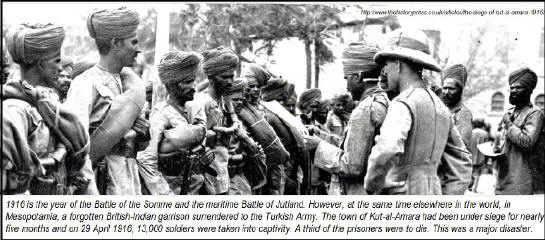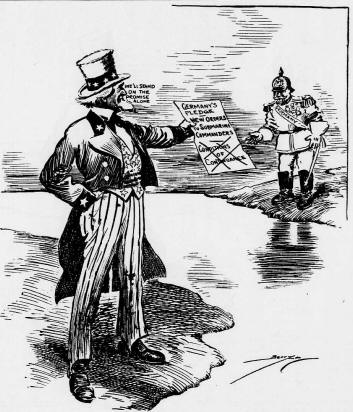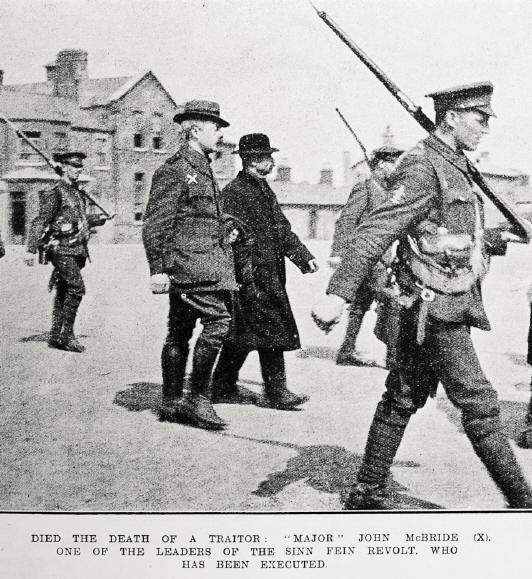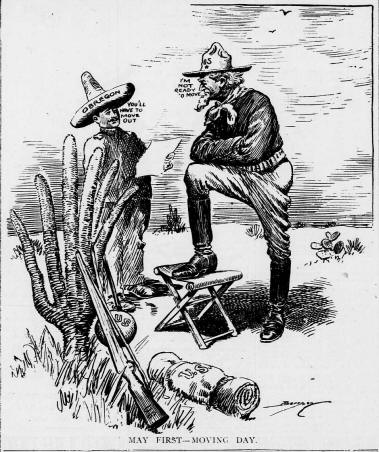May 1916
May 5
British Surrender in Mesopotamia
Maj. Gen. Charles Townshend, Commander of the British forces besieged at Kut-el-Amara, Mesopotamia by Turkish forces since last December, has surrendered to the Turks. The general destroyed all his guns and munitions before surrendering. Gen. Townshend surrender to avoid starvation of his forces as they were only receiving
small supplies of food by aero planes.
An official statement received Saturday from London showed that a last ditch effort to send supplies to the garrison had failed. A ship laden with supplies had been sent up the Tigris, but it grounded about 4 miles east of the city. Less than a score of miles away, on the banks of the Tigris below the city, is a relief army,
which for months had been attempting to reach the besieged forces. A few weeks ago several victories were announced and hope ran high in England that the mission would succeed. Of late, however, the Turkish resistance has increased and, aided by floods, they have been able to hold the British in check.

No official figures have been given out as to the number of troops lost. Unofficially the number has been estimated as high as 50,000, but it was probably considerably smaller than this as this force has suffered heavy losses in severe battles with the Turks.
The expedition began on the Persian Gulf in November of 1914, and throughout 1915 worked its way up the Tigris. It was early December of last year at that Gen. Townshend’s army was beaten in a battle 18 miles below Baghdad and retreated to Kut-el-Amara. Since that time it has been besieged by the Turkish army. Cut off from all
communication with the outside world except by wireless. The British beat back many attacks by the Turks, and defended themselves so successfully that the Turks at length deserted from their efforts to take the place by storm and decided to starve out the British.
Irish Uprising Ends
The official announcement was made on Monday that all the rebel leaders in Dublin have surrendered. The proclamation issued by provisional Irish President Patrick Pearse advising the surrender of all the rebel forces was a follows: "In order to prevent further slaughter of unarmed people, in hopes of saving the lives of our
followers, who are surrounded and hopelessly outnumbered, the members of the Provisional Government have agreed to unconditional surrender, and the commanders of all units of the Republican forces will order followers to lay down their arms."
1,000 rebel prisoners were marched through Dublin on Wednesday under strong military escort. They included many in their teens and several women. It is said that several thousand more prisoners have been taken by the military across Ireland. The prisoners included a considerable number of people of high stations, including
intellectuals identified mainly with the Irish literary movement.
Four of the eight Republican ringleaders were been tried by court-martial, found guilty, and shot Wednesday morning. Patrick Pearse, was among those shot. Another rebels found guilty and shot Wednesday morning was James Connolly, who was styled, General of the Irish Republican Army. Thomas Clark and Thomas McDonough were the
two others executed.
Germany Replies to Submarine Warfare
 The reply of Germany to the last note of the United States on the subject of submarine warfare was received today. It announces that orders has been issued to submarine commanders that "in accordance with the general principles of international law, merchant vessels both
within, and without the declared a naval war zone, shall not be sunk without warning, and without saving human lives unless the ship attempts to escape or offer resistance."
The reply of Germany to the last note of the United States on the subject of submarine warfare was received today. It announces that orders has been issued to submarine commanders that "in accordance with the general principles of international law, merchant vessels both
within, and without the declared a naval war zone, shall not be sunk without warning, and without saving human lives unless the ship attempts to escape or offer resistance."
In regard to the general submarine issue and the relation of submarine warfare to neutral shipping, Germany noted she had always been willing to conduct its submarine warfare in accordance to this policy but had chosen not to because the United States was unable to obtained from Great Britain an agreement to conduct the
blockade of Germany in such a manner that "thousands of innocent women and children will not be starved into submission."
The note declares that the German people regard the United States as having discriminated against Germany in that it has demanded, on pain of a break of relations, a suspension or material modification of submarine warfare, while merely protesting to Great Britain against the blockade methods of that country, designed to
starve Germany into submission. Nevertheless, Germany says, it will go to the utmost limits of concession, out of friendship lasting 100 years.
England Offers Tangiers to Spain
According to reports, Great Britain has offered to Spain's possession of Tangiers if Spain will seize the German ships in Spanish ports and will consent to the closing of the Straits of Gibraltar to all neutral ships except those flying the Spanish flag.
May 12
Irish Rebels Tried
Major John McBride, the eighth leader of the Sinn Fein rebellion, has been shot flowing his conviction by field court martial. Major McBride fought throughout the Boer war against British rule with the Irish brigade. When the Boers finally surrendered he made his escape and took refuge in Paris, where he later married Miss
Maud Gonne, known in home rule circles in Ireland as the Irish Joan of Arc. In 1905 Major delivered a series of lectures in the United States on Irish politics. McBride maintained his interest in Irish political affairs and was always identified with the extreme or separatist faction of the national party.

According to the British, justice is being dealt out to the Sinn Feiners on the pure facts provided by incontestable testimony regarding their active participation in the recent rebellion. Suspicion is not enough for court-martial to condemn any man and the killing of soldiers or the destruction of property does not enter the
minds of the military judges. According to the British, there is no "Dragooning to death" of the rebels
As soon as a rebel falls into the hands of the authorities his identity is established and the evidence is recorded of the circumstances in which he is taken. The prisoner is then placed in confinement and a preliminary inquiry is held and lawyers drawn up the charges.
Before the prisoner is brought before the court the charge against him is read in full, in order that the accused may prepare to defend himself. The prisoner has no legal defender, but should he desire to call witnesses the court immediately calls them to testify in complete freedom. First comes testimony from the prosecution,
after which the prisoner pleads in his defense if he wishes, or confesses his guilt.
The judges then considered the facts and deliver judgment. Should sentence of a rebel be the supreme penalty of death, as has been the case in a number of instances, the prisoner is ask whether there are any relatives or friends he would like to see. If so, they are immediately brought to his place of confinement. He also is
permitted to have the services of a clergyman, who remains with him until just before the sentence is carried out. The following morning the condemned prisoner is shot.
German Note Hints at Peace
Careful attention is being paid to the portion of Germany’s note outlining its new rules for submarine warfare that touches on peace. Some officials believe unusual significance should be attached to that part of the note because it was taken to indicate officially that recent speeches by the German Chancellor were intended as
notices to the world that Germany was ready for peace on certain terms. The note says: "the German government, conscious of Germany’s strength, twice within the last few months announced before the world its readiness to make peace on the basis of safeguarding Germany’s vital interests, thus indicating it is not Germany’s fault if peace is still
withheld from the nations of Europe."
Western Front Fighting Resumes
After 77 days of battle the Germans are making a new attack before Verdun with another formidable army. The current fighting seems to be the most determined effort yet made by the German army to break through and capture Verdun.
Heavy guns are pounding the defenses of the fortress and bombardments of unprecedented violence are being followed by attacks by great forces of men. After their initial success against Hill 304 however, the Germans have failed to make progress.
The latest assaults of the Germans have served to demonstrate the high pitch of efficiency to which the French have brought the use of machine guns. The 48-hour preliminary bombardment of the Germans is described by eyewitnesses as more severe than anything that heretofore has been experienced, and it is remarked that the
Germans were justified in believing no human being could have lived in the zone subjected to the bombardment.
Nevertheless, the French are so adept at constructing underground shelters. When the German infantry steps from the trenches scores of well-placed machine guns opened concentrated fire, thinning the ranks of the attackers before the advance is fairly begun. French officers state that the losses of the Germans, in proportion to
the number engaged, was as great as in any other section of the war. It is said that a Prussian division, which was engaged on Sunday, lost more than 50% of their men due to machine guns.
 The Mexican Situation
The Mexican Situation
On Wednesday Pres. Wilson called out the militia of Texas, Arizona and New Mexico to deal with the border situation. In addition, three regiments of regular infantry were order to the border. The total additional forces sent to the border is now approximately 7,000 men.
With the dispatch of the four additional regular regiments to the border practically the entire mobile army of the United States, with the exception of five troops of cavalry and a battalion of engineers, is either mobilized upon the border in Mexico or en route there. The remainder of the infantry and cavalry is on Foreign
Service or in Alaska.
Russian Advisor Assassinated
Gregory Rasputin, the Russian monk who is reported to have exercise great influence over Emperor Nicholas, has been assassinated.
May 19
Effectiveness of the Aero Planes
As the great European struggle progresses the power and effectiveness of the aero plane has becomes more manifest by the increasingly conspicuous part they play in the fighting. This fact is indicated by the official statement issued in Berlin that during the month of April, 26 Allied machines were shot to the earth, while
Berlin admits to losing 22.
Tuesday’s fine weather favored aerial activity, and 27 combats in the air took place. And a great deal of successful aerial photography was accomplished. An Albatross was attacked and shot down near the front. Another was driven down north of Verdun. A third, attacked by a German plane, was seen to turn upside down near the
ground. The French reported one of its reconnaissance planes failed to return. It was seen to land under control in hostile territory. A French scout airplane is also missing.
Lt. Navarre brought down his 10th & 11th German airplanes. One crashed to the earth in the Argonne woods, the other fell within French lines and the two occupants were captured. Another German airplane was attacked by LT. Nungesser and crash down in the Bers forest. It was the fifth airplane brought down by this officer.
The American flyers who had been in the service of the French army for the past year and who were recently brought together to form a flotilla under the name of the Franco-American Flying Corps, took part in the expedition over the German line for the first time as a separate unit. They sustained particularly heavy shelling as
they recrossed the front.
The plane piloted by Lt. William Thaw of Pittsburgh had part of its tail shot off, and the propeller was damaged by a shell, but Lt. Thaw brought it safely back to camp.
Cpl. Victor Chapman’s machine was also hit and driven off of its course, returning so late to the base as to cause anxiety regarding Chapman’s fate. Cpl. John McConnell of Carthage North Carolina was flying at a height of 12,000 feet, the German shells burst all around him, showing that the range of the German in the aircraft
guns has been lengthened.
The flotilla started at daybreak and spent nearly 2 hours conducting reconnaissance under sustained fire, but encountered no German air machines, and no one was wounded. Altogether the flotilla is made up of seven Americans. Three more French American flotillas are to be organized from the 40 additional American volunteers now
in training.
Austrian's Question French Use of Submarines
According to Austrian news service, the Austrian steamer Dubrovnik and other Austrian vessels, including the hospital ship Electra, was sunk by a French submarines. The Dubrovnik had 19 passengers onboard, including several women and children, when she was torpedoed. Three bodies of women recovered and four members of the crew
and four passengers are missing. The Dubrovnik was sunk by two torpedoes fired without warning by a French submarine.
The first torpedo hit the starboard side, and the ship immediately began sinking. As the passengers rushed to the lifeboats a second torpedo struck the ship, crushing the starboard lifeboat with those in it. 16 passengers were rescued from a second boat.
The French claim the ship was carrying ammunition, but the Austrians claim, as the ship could carry only 480 tons, she was not able to carry troops nor ammunition. Besides this, the distance of the submerged submarine from her was so great that it was impossible for it to discern the class of persons carried by the steamer.
The Austrians claimed that the firing of a second torpedo against the sinking steamer, with lifeboats afloat, must be qualified as intentional murder. The Austrians hold the Italian government equally responsible with the French government, since the fresh submarine was operating in Italian waters.
May 26
Fighting Continues on Verdun Front
The Germans are striving with every resource in their power to capture hill number 304 and Dead Man’s Hill. The purpose of the drive was to win back the famous Fort Dououmont, which was wrested from them by a brilliantly planned and executed offensive on Monday.
Without full possession of the Fort and the two hills the Germans could not hope to get anywhere nearer to the capture of Verdun. Driven to desperation by seeing so much of its work undone, the German command has hurled attack after attack against Fort Dououmont.
All day Tuesday the tide of war ebbed and flowed, inches of ground being won and lost at an appalling cost in men. Again and again after reducing trenches to crumbling heaps of ruins by artillery shells, German infantry advanced only to be caught and swept away by the hurricane of fire from French machine guns. When night fell
the positions on both sides were unchanged.
On Wednesday however, the tide of battle turned in favor of the Germans who hurled fresh legions against the ruins of Fort Dououmont, and after a lavish expenditure of life, succeeded in recovering the fort and ground they had lost at the beginning of the week.
Austrian Claims Success Over Italians
In Tyrol the Austrians have followed up their successes by compelling Italian forces to evacuate the Col Santo. According to the official Austrian statement - 13,000 Italian prisoners have been captured and 107 guns have been taken.
This newest offensive by the Austrians is declared to be, like all the other offensive movements in this war, a further exhibition of the efficiency of properly handled artillery. The Austrians began their operations with an artillery barrage, which included numerous new guns of high efficiency.
The Austrian guns succeeded in silencing the Italian guns in the sectors where the offense that was planned, and thus the infantry was able to begin work on Monday. Since then, bitter fighting has been continuous, but the latest official communications confirm that Austrian troops were able to push the Italians back across the
border.
Russian Cavalry in Mesopotamia
A force of Russian cavalry has joined the British army on the Tigris in Mesopotamia after a bold and adventurous ride. How this important juncture was affected is still unknown, and the story will be awaited with intense interest. The supposition is that the cavalry came from the Russian army which is threatening Khanikan, but
it still remains a puzzle where and how the Russians succeeded in crossing the Tigris river.
Their sudden appearance has raised the question whether the Russians have already cut the Baghdad railway at Mosul. In any case, the unexpected appearance of the body of cavalry is as great a surprise as was the first landing of Russian troops at Marseilles, and is another instance of the swift and stealthy movement of the
Russian forces in Asia Minor.
Meanwhile, 4,000 German troops are expected at Baghdad in June, says the Times Bucharest correspondent. 12,000 Austrians already there. The Turks are weakening the defense of Constantinople, sending all possible reinforcements to Asia Minor and concentrating a large force at Marasha, three days march northeast of Alexandretta,
in northern Syria, where they fear an attempted landing by the Allies. The Constantinople dispatch says that German Field Marshal von Sanders is also establishing a strong force of Turkish troops on Turkey’s north east border to oppose the expected advance of the Russians.
Read past editions of News Reports From the Front